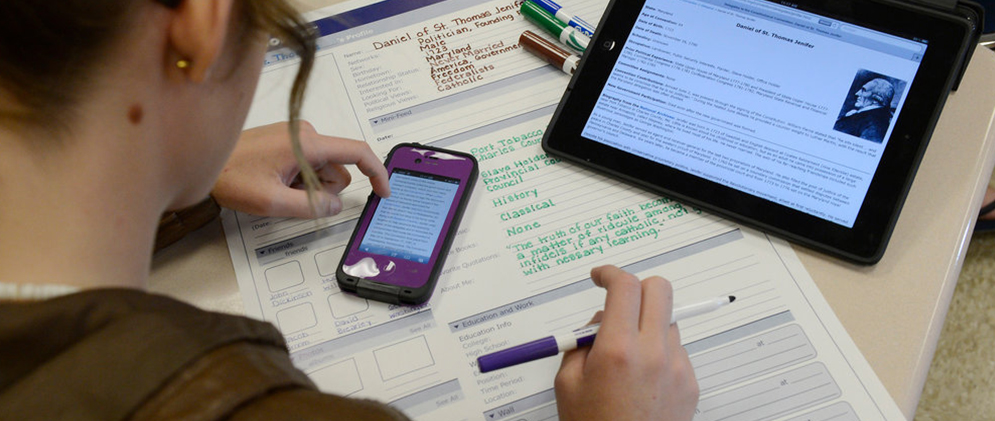Contextual Future of Situated Schools
From The Theme
CONTEXTUAL FUTURES FOR SMART PERSONAL DEVICES
WHAT IF?
What if we could design more effective and empowering digitally mediated learning environments?

WHAT WE SET OUT TO DO
This research addressed the factors that drive engagement and encourage learning, as schools become more and more digitally mediated. We set out to collect important insights from new contexts in which smart digital devices will be used in secondary schools. We proposed an ethnographic study of the techno-social situations that emerge from high school student use of mobile personal devices, and of the strategies educators might use to redefine their roles within these spaces. The program would involve youth participatory action research, recruiting and training student researchers and designers, with the goal of developing a mobile application aimed at improving engagement and learning.
WHAT WE FOUND
We developed a participatory design-based experiment for students at a local high school (Palo Alto High School). Students formed a “research team” that conducted user research on relevant factors – student social and mobile media use, consumption of student journalism, and impact on school based identities and roles. The design goal was to increase reader participation, feedback and discussion. The student group developed and deployed an app to foster reader engagement and conducted follow up interviews.
Research results revealed insights that can help schools reposition themselves within digitally mediated spaces, taking advantage of student technology use to develop engaging learning opportunities for students, as well as supporting active student roles and identities. Observations confirmed that powerful learning happens when people become part of a community and that students learn well when they are together learning about something that matters to them. Mobile was observed to be a highly personal but also a social experience. Further research will explore the impact of current events, and how the digital media can structure both civic participation and demagoguery within a real-world school community.
LEARN MORE
mediaX Research Update, Fall 2016
PEOPLE BEHIND THE PROJECT
 At the time of the project, Paulo Blikstein was an Assistant Professor at the Stanford Graduate School of Education where he directed the Transformative Learning Technologies Lab and the global FabLearn Program. Blikstein’s research focuses on how new technologies can deeply transform the learning of science, technology, engineering, and mathematics. He creates and researches cutting-edge educational technologies, such as computer modeling, robotics, digital fabrication, and rapid prototyping, creating hands-on learning environments in which children learn STEM disciplines by building sophisticated projects and devices. As of 2018, Dr. Blikstein is the Associate Professor of Communication, Media & Learning Technologies Design in the Department of Mathematics, Science & Technology.
At the time of the project, Paulo Blikstein was an Assistant Professor at the Stanford Graduate School of Education where he directed the Transformative Learning Technologies Lab and the global FabLearn Program. Blikstein’s research focuses on how new technologies can deeply transform the learning of science, technology, engineering, and mathematics. He creates and researches cutting-edge educational technologies, such as computer modeling, robotics, digital fabrication, and rapid prototyping, creating hands-on learning environments in which children learn STEM disciplines by building sophisticated projects and devices. As of 2018, Dr. Blikstein is the Associate Professor of Communication, Media & Learning Technologies Design in the Department of Mathematics, Science & Technology.
 Chris Proctor is a PhD Candidate in the Learning Sciences and Technology Design program at the Stanford University Graduate School of Education and a member of Dr. Paulo Blikstein’s Transformative Learning Technologies Lab. His research explores how computation as a literacy affords new cognitive capacities and social roles. Within schools, Chris is interested in the acquisition of computational literacy, the communities of practice that form around the production of computational media, and the relationship between computational literacy and textual literacy.
Chris Proctor is a PhD Candidate in the Learning Sciences and Technology Design program at the Stanford University Graduate School of Education and a member of Dr. Paulo Blikstein’s Transformative Learning Technologies Lab. His research explores how computation as a literacy affords new cognitive capacities and social roles. Within schools, Chris is interested in the acquisition of computational literacy, the communities of practice that form around the production of computational media, and the relationship between computational literacy and textual literacy.